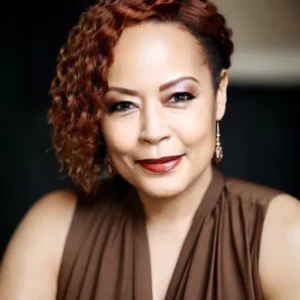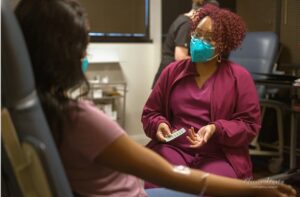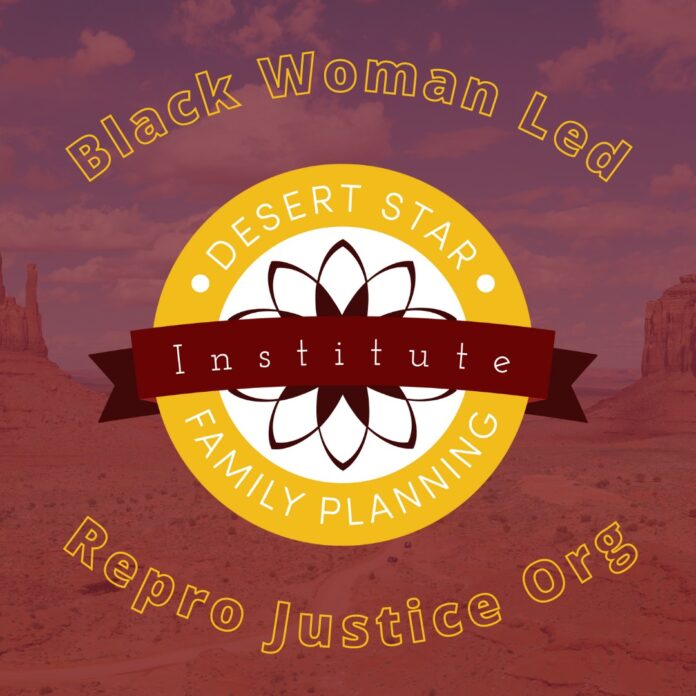( ENSPIRE Health & Wellness ) Desert Star Family Planning LLC Transitioning to a Nonprofit
ENSPIRE Contributor: Nicole Armstrong
Desert Star Institute for Family Planning acts as a haven for reproductive and gender-affirming healthcare in the Phoenix, Arizona area. Desert Star provides lifesaving care, including abortion services, STI diagnosis and treatment, post-miscarriage care, and more. The institute strives to provide consistently improving care to those who need it, and they are currently shifting models to improve their programs and services. Desert Star focuses on equitable care, and they are making strides towards improving initiatives that promote equal care for all. The institute’s founder, Dr. DeShawn Taylor, who solely owned the clinic for a decade, is currently heading Desert Star Family Planning LLC’s transition from the LLC business model to a not-for-profit model.
According to Dr. Taylor, Desert Star’s shift to a non-profit will enable it to be more community-based. Dr. Taylor also noted the change will allow Desert Star to improve its equity efforts as well, and Desert Star will entirely focus on creating access to Black, Indigenous, and other people of color. Desert Star provides a range of services and plans to expand and improve its current services, which include direct services, training future healthcare providers, facilitating patient assistance programs, and advocating for policies that enhance access to care.
The ENSPIRE team interviewed Dr. DeShawn Taylor to discuss Desert Star’s future.
What specifically will the new and improved services look like for community members because of changing the model?
First, I want to give a little background. The clinic that the nonprofit acquired was a clinic that I founded 10 years ago. Desert Star Family Planning LLC was created during a time when abortion clinics were closing across Arizona because of the laws that were passing year after year after year. Literally, from 2009 to 2022, there was a restriction signed into law in Arizona on abortion except for one year. Then the only difference is Arizonans elected Katie Hobbs as the governor. So for 2023, she vetoed every bad piece of legislation.
That stabilized access to abortion services, during a very hostile time because it was opened in 2013, and so for me, I am a board-certified obstetrician-gynecologist, also trained in complex family planning. My goal was to create an environment for people accessing abortion care to feel like they were just at the doctor’s office because abortion is healthcare. When people are seeking abortion services, they should be made to feel that way. The goal was to integrate abortion services into all the other services I provided. Now, I will say I stopped providing obstetrical care back in 2011, so my practice was otherwise all the things that someone who can experience pregnancy would need except for that.
Throughout working, I intentionally located in an ethnically diverse, socioeconomically depressed area of Phoenix to provide dignified and exceptional healthcare to people who have been marginalized in life and medicine, honestly. As I was caring for this population of people, I started to notice some things that needed to be addressed that a for-profit model wasn’t going to be able to do.
What exactly in the payment model is changing with the nonprofit model?
We had programs through the nonprofit that we administered at the clinic that provided care to people absolutely free. Certain types of contraceptives, some assistance for their abortion services, and ultimately the nonprofit covered these people’s services. But in a for-profit model, that was money that the clinic didn’t see. So now that the clinic is a nonprofit, we can provide more care to people without them having any cost sharing.
And, you know, long-term contraceptives are very expensive, so I’ll share that in 2023, we provided the hormone-releasing IUD, Liletta, to seven people, and the birth control implant, Nexplanon, to three people. Overall, 10 people received long-term birth control through our long-term birth control program. The cost of that care for 10 people was $10,582.
You can imagine, for example, we just had a major fundraising Global Day of Giving, Giving Tuesday. We were trying to explain to people when you set these fundraising goals, where does the money go? We had a donor who matched $ 5,000. So basically, that means if we raised $5,000, then the donor matched $5,000. So we’d raised $10,000, and so we were like, do you really understand what $10,000 does? $10,000 helps 10 people.
I think that’s a wake-up for people who don’t quite understand what the cost of these things are and how out of reach it can be for people who don’t have insurance or have insurance that has carved out birth control, which is happening more and more with the current political landscape. So now we can help more people. It’s not taking away revenue from the clinic to provide free services. It’s not charity care like it’s called in a for-profit entity, but it is just part of the care we do because we have dedicated donors and supporters who are helping us do this for people.
What is the most impactful benefit you have seen in the surrounding community from Desert Star?
Gosh, there are so many. Being an abortion provider is just amazing. Even in these difficult times, even with all the political garbage that’s going around, the gratitude that people have, not just for receiving the services, because there are other options, but when people share how we made them feel, how they felt seen, heard, and well cared for; how we changed the trajectory of their lives. One person wrote a postcard that said, “you most definitely saved my life.”
There are so many circumstances that people are under that are driving their decision to end a pregnancy, and they deserve respect. They deserve excellent care; they deserve to be treated with dignity; they deserve not to be judged, right? And unfortunately, we live in a society where people do a social good from a place of saviorism, and when you’re saving people, there’s judgment there, you know? When you’re saving people, there’s judgment.
So what we’re doing is we’re creating an environment where we’ve carefully curated the staff and how they receive information, from the phone, to the internet, to the website, these things are carefully considered so that people can know that we are thinking about them and we really care about them, and we’re not trying to save them, that we trust them to make the decisions that are best for them themselves and their families.
Outside of donations on the website, are there any other prominent ways to support Desert Star from outside of the Phoenix area?
One way to support the clinic is for people to amplify our message. People can follow us on social media, we are on Instagram and X/Twitter as @desertstarfp, and we’re also on Facebook as Desert Star Institute for Family Planning. We have a YouTube channel that when we have virtual educational events, we’ll record them and people can revisit them on our YouTube channel. We also have a newsletter that we send out monthly. People can sign up for the newsletter at our website, www.desertstarfp.org, so for people who don’t feel like they can afford to donate, there are still ways to help us, and that is amplifying our message and introducing our organization to a broader audience.
Dr. Taylor’s decision to sell Desert Star Family Planning LLC to the nonprofit will allow the clinic to expand its services and center equity in reproductive care for marginalized groups. As it moves forward into a new model, Desert Star Family Planning has a revitalized future ahead of it.
Related Articles: Dr. Karen A. Scott: A Catalyst in the Fight Against Obstetric Racism, Celebrating Transgender Day of Visibility With Planned Parenthood, 4 Black Female Nonprofit Leaders Call on Biden to Achieve Health Equity For Black Americans







